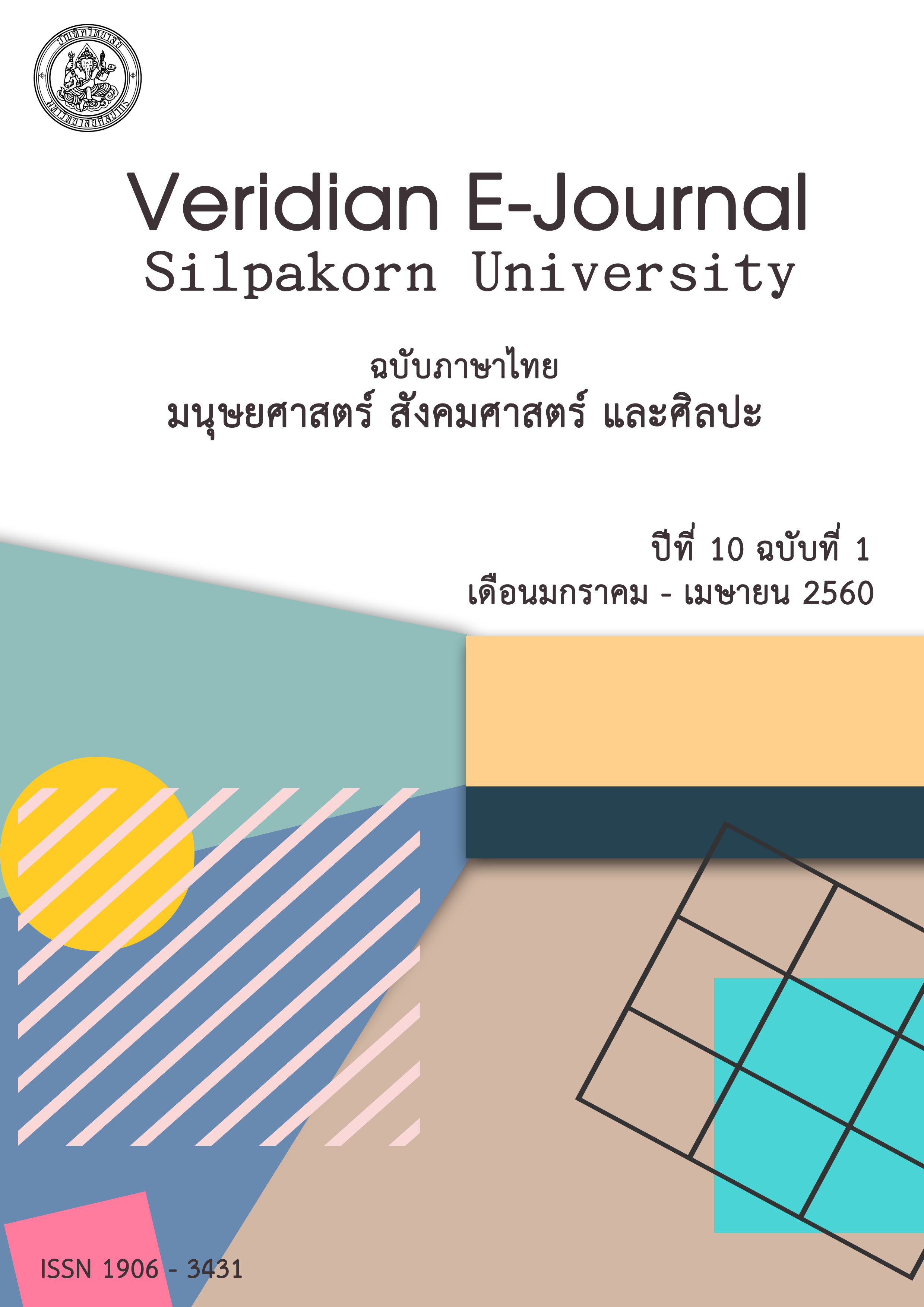กระบวนการในการจัดการศึกษาโดยครอบครัวแบบเสริมสร้างทักษะชีวิตและ การทำงานในศตวรรษที่ 21
Main Article Content
บทคัดย่อ
การวิจัยครั้งนี้มีวัตถุประสงค์เพื่อทำความเข้าใจกระบวนการในการจัดการศึกษาโดยครอบครัวแบบเสริมสร้างทักษะชีวิตและการทำงานในศตวรรษที่ 21 ผ่านมุมมองของครอบครัวต้นแบบที่มีแนวปฏิบัติที่ดี จำนวน 9 ครอบครัวซึ่งมีคุณสมบัติครบถ้วนตามเกณฑ์ที่ตั้งไว้ ซึ่งพิจารณาจากผู้ปกครองที่ไม่เคยส่งบุตรเข้าศึกษาในระบบโรงเรียนเป็นอันดับแรก โดยใช้กระบวนการวิจัยเชิงคุณภาพแบบกรณีศึกษา เครื่องมือที่ใช้ในการวิจัย ครั้งนี้ คือ การสัมภาษณ์เชิงลึก การสังเกตแบบไม่มีส่วนร่วม เอกสารหลักฐาน เช่น แผนและแบบประเมินผลการจัดการศึกษา บักทึกข้อความในเฟสบุค เป็นต้น ผู้วิจัยทำการเก็บรวบรวมข้อมูลด้วยตัวเองพร้อมทั้งสังเกตพฤติกรรมและความสัมพันธ์ในครอบครัวของผู้ให้ข้อมูล ทั้งนี้ได้ทำการวิเคราะห์ข้อมูลด้วยการวิเคราะห์เนื้อหาเพื่อหาข้อสรุปและตีความจากข้อมูลที่เกิดขึ้นจริง ผลการวิจัย พบว่า ผู้ปกครองต้นแบบมีวิธีการในการจัดการศึกษาโดยครอบครัวที่ทำให้ผู้เรียนเกิดทักษะชีวิตและการทำงานในศตวรรษที่ 21 สามารถจำแนกได้เป็น 6 ขั้นตอน คือ 1.) ศึกษาสภาพของผู้เรียนและความพร้อมของครอบครัว ประกอบด้วย การสังเกตผู้เรียนและการสร้างข้อตกลงร่วมกันในครอบครัว 2.) การวางแผนการจัดการศึกษา ประกอบด้วย การวางแผนการจดทะเบียนการจัดการศึกษาโดยครอบครัวและการวางแผนทางการจัดการศึกษา 3.) การค้นคว้าหาข้อมูล ประกอบด้วย การค้นหาจากสื่อและการค้นหาจากผู้รู้/ผู้เชี่ยวชาญ 4.) การดำเนินการจัดการเรียนรู้ ประกอบด้วย การสร้างแรงบันดาลใจให้แก่บุตรและการจัดกิจกรรมการเรียนรู้ 5.) การประเมินผล ประกอบด้วย การประเมินภายในและการประเมินภายนอกและ 6.) การปรับปรุงการเรียนรู้ ประกอบด้วยการสร้างข้อตกลงร่วมและการเชื่อมโยงต่อยอดการเรียนรู้ ซึ่งการจัดการเรียนรู้โดยครอบครัวแบบเสริมสร้างทักษะชีวิตและการทำงานมีความซับซ้อนในองค์ประกอบและเงื่อนไขที่แตกต่างกันไปในแต่ละครอบครัว ชุมชนและบริบททางสังคม วัฒนธรรมที่รายล้อมอยู่รอบครอบครัว ผู้ปกครองจึงต้องเรียนรู้ที่จะแปรเปลี่ยนความซับซ้อนให้กลายมาเป็นปัจจัยผลักดันให้สามารถเสริมสร้างทักษะชีวิตและการทำงานในศตวรรษที่ 21 ให้แก่ผู้เรียนได้
This research aims to understand the process of homeschooling and strengthen life and career skills in the 21st century. The qualitative research was conducted by interviewing 9 families with the best practices and full specifications meet the set criteria. This is considered by parents who have never sent their children to school. The research’s tools were in-depth interviews, observation is not involved, documentation such as plans and evaluation forms for educational management, buzz messages in facebook. The researcher collected data by himself and observed the behavior and family relationships of the key informants. The data were analyzed by content analysis for conclusions and interpretation based on actual data. The study results revealed that parents have to master the method of homeschooling students the skills that make living and working in the 21st century. The process can be divided into six phases: 1.) Study of the students and the availability of family , consists of observing the students and the creation of a joint agreement of the family, 2.) Management planning study, includes a planned registration, education and family planning education management 3.) Search for learning process, includes search from the media and from the knowledge / expert 4.) The implementation of learning management, includes the creation and inspiration to children learning activities 5.) Evaluation includes an assessment of the internal and external evaluation and 6.) Improving the learning agreement includes the creation of links and further learning. This learning by strengthening family life and career skills in a complex composition and the different conditions in each family, community and social context that surrounded the family. Parents must learn to transform the complex into a catalyst to enhance life and career skills in the 21st century to the study.

